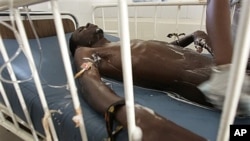At Camp Penal maximum-security prison in Dakar, Amadou, who withholds his real name to protect his identity, is talking to his sixth and last group of prisoners about AIDS. Since early this morning, the young Senegalese activist has spoken with more than 150 detainees -- men from all over the world, some from as far away as El Salvador and France, imprisoned for everything from petty theft and fraud to rape and murder.
Amadou is no stranger to many of these inmates, having given talks and helped out at a Dakar health clinic since 2007. In December 2008, he was even arrested along with eight other men during what he calls an AIDS meeting on the outskirts of the capital. The men were charged and convicted for "indecent sexual behaviour," and their eight-year sentences made international headlines. Amnesty International and Human Rights Watch intervened, and, after serving four months -- half of which was spent in Dakar’s notoriously overcrowded Reubeuss prison, and half at Camp Penal -- the men were freed.
Ever since, Amadou has been leading AIDS awareness talks with prisoners, one of the most vulnerable groups in this predominantly Muslim nation where prison authorities and even members of the National Alliance Against Aids -- the two groups who permit the talks -- often refuse to acknowledge the issue of men who have sex with men.
But whether they admit it or not, Amadou says, everyone knows there are sexual relations among male prisoners.
Comparative HIV-infection rates
Senegal has one of the lowest rates of HIV in sub-Saharan Africa: less than one percent of the population. But among men who have sex with men, HIV, the virus that causes AIDS, is estimated at twenty-two percent. Inmates are thought to be especially susceptible to HIV transmission due to the prison system's high incidence rate of hard drug use and forced sexual relations.
Brendan Hanlon, chief executive at AVERT, an AIDS charity based in Britain, says there are no studies showing HIV rates in Senegal’s prisons specifically, but that in other African countries, such as Zambia and South Africa, rates among prisoners are twice that of the general population.
"The first thing is that when tackling the HIV epidemic, prisoners are often neglected and overlooked -- a phenomenon which happens worldwide," he says. "And so within prisons it is difficult to obtain, for example, clean equipment for injection, and also, of course, ... condoms and also education about HIV."
Alassane Balde, head of medical staff at Camp Penal, says use of hard drugs such as crack cocaine and heroin are infrequent at the prison mostly because of its high cost. When asked about sexual relations among prisoners, he is reluctant to comment.
"Their religion does not permit this sort of activity, and they are very strict about it, because it is a taboo," he says via translator. "The authorities have given Amadou and his colleagues the opportunity to give these talks, but once that is finished, they do not want to continue talking about men having sex with men, because not everyone is this way."
There are currently 13 known HIV cases among Camp Penal's population of more than 800 prisoners. There is no mandatory testing in place, and anonymity is strictly enforced. The men who are infected receive free anti-retroviral treatments and have monthly check-ups. But the lack of prevention strategies at the prison means other inmates may inadvertently be exposing themselves to the disease.
Hanlon says HIV reduction has been proven in prisons that offer needle-exchange programs or condom distribution.
"But the issues ... especially in Muslim countries is that, for governments and for a particular prison to introduce programs such as needle exchange, such as condom distribution, it admits to an issue which the laws and the rules say shouldn’t be there," he says. "So it’s quite a difficult situation, but that is often what happens."
Winning a battle, but not the war
Although Amadou considers his prison talks a step forward in Senegal's struggle against HIV, he is quick to point out that the fight cannot be won in a country where gay rights are continually shunned.
"The work they are doing is not for themselves," he says via translator. "It is for everyone. But is there any person of authority who would dare give this message?"
After Amadou’s talks, many prisoners asked to be tested. In the coming weeks, a medical team is expected to visit Camp Penal for voluntary HIV testing.
Meanwhile Amadou will continue giving his talks.
In Senegal's Prisons, a Small Victory for AIDS Awareness




